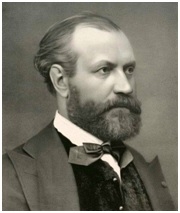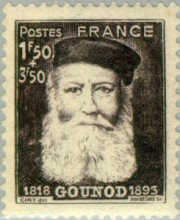Charles Gounod Biographical Information
Charles Gounod Biographical Information |

 “God created three beautiful things: music, flowers and women. It is them I always sang.”
“God created three beautiful things: music, flowers and women. It is them I always sang.”
— Charles Gounod
Charles-François Gounod was born June 17, 1818, the second son of François-Louis Gounod and Victoire Lemachois. His father was a painter and engraver who died when Charles was five. To support her family, Gounod’s mother taught piano. Young Charles was one of her students.
From 1829 to 1835 he attended the Lycée Saint-Louis, an intense and competitive preparatory school in the Latin Quarter of Paris. Among his classmates were Louis Pasteur and Charles Baudelaire. At the Lycée, Gounod pursued a degree in philosophy before shifting his attention to music.
After graduating from the Lycée, Gounod studied composition with Anton Reicha. During this time, he attended performances of Rossini’s Otello and Mozart’s Don Giovanni. These two experiences were highly influential in Gounod’s pursuit of operatic composing. He extolled, “For a composer, there is but one road to follow in order to make a name, and that is the theatre [the operatic stage].” It would be some years before Gounod would realize this compositional height. He did, however, write primarily vocal music as a developing composer, and throughout his life.
When his teacher Reicha died in 1836, Gounod began studies at the Conservatoire de Paris, studying with Fromental Halévy and Pierre Zimmermann (whose daughter Gounod was to marry in 1852). His best friends there were Camille Saint-Saëns (Carnival of the Animals) and Georges Bizet (Carmen). All three (in turn) won the Prix de Rome composition prize after composing the best choral cantata that year. Gounod’s prize-winning work was Fernand, which nonetheless is not among the pieces for which he is known today.
He was deeply religious, considering for some time going into the priesthood.
Throughout his life, he was seen dressed in clerical garb.
In 1839 he traveled to Rome to study 16th century Italian music, particularly
the compositions of Palestrina. He remained in Rome for several years before
returning to Paris. Gounod also visited Verona, where Romeo and Juliet takes
place.
His opera Faust, completed in 1859, was his first major success with the public. Its reception with music critics, however, was less than positive. Criticism of Faust was that it was more complex than his other works, one reviewer going so far as to suggest that Gounod hadn’t actually written it. When challenged to a duel to back up his allegation, the reviewer recanted.
Romeo and Juliet was composed when Gounod was 49, one of some 80 settings
of the Shakespearean tragedy. Many years earlier, while still at the Lycée, he
had heard and was captivated by Hector Berlioz’s symphonic setting of the work.
It was at a rehearsal of Berlioz’s Romeo and Juliet that the two men met.
Gounod gushed with praise of Berlioz, whose own reputation was that of an
oddball. The friendship between the two, though fifteen years apart in age, was
sealed. It took Gounod twenty-five years to compose his own setting of Romeo
and Juliet, and much of the lush, symphonic style of Berlioz is reflected
here.
Most of the work was composed from the spring of 1865 to August 1866 at Saint
Raphael, Provence, in a villa overlooking the hills of the Gulf of Fréjus.
Gounod was joyous in his surroundings, and wrote seemingly spontaneously. He was
delighted with the results of his composition, writing, “...the first act ends
brilliantly; the second is tender and dreamy...the fifth tragic...It’s a fine
progression…”
Despite a few early casting problems (including difficulty finding an adequate Romeo) and the composer’s last-minute rewriting of the entire final act, the opening of Romeo and Juliet was a success, and the opera proved to be one of Gounod’s most successful compositions. The opera remains largely true to the plot of the original, apart from the final scene in the tomb: in Gounod’s version, the doomed couple share a moment of consciousness long enough for a final duet, before Romeo succumbs to his poison and Juliet stabs herself.
With the outbreak of the Franco-Prussian War, and the siege of Paris by the Prussian army, Gounod moved his family to London for several years. On returning to Paris some eight years later, Gounod continued working, but he was never to regain the stature he achieved with Romeo and Juliet.
While Gounod is by no means the best known composer of the 19th century, his music maintains importance in many cultural arenas, and is honored in France. The Metropolitan Opera House opened to accolades with Gounod’s Faust in 1883, and his Funeral March for a Marionette is better known to many as the theme music for the television show Alfred Hitchcock Presents.
— Marsha Turin
primary sources:
Harding, James. Gounod. Stein and Day, 1973.
Davin, François. Charles Gounod: His life, his works. http://www.charles-gounod.com/vi/